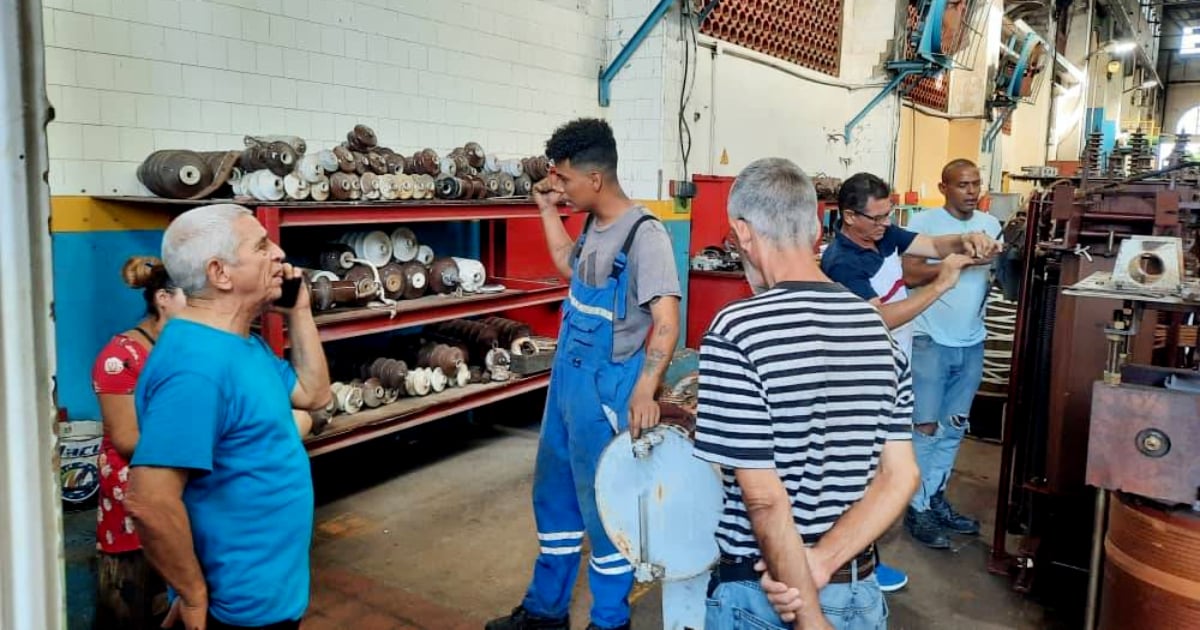Alfredo López Valdés, the general director of the Union Eléctrica de Cuba (UNE), can't seem to catch a break. Already in the crosshairs of public discontent due to ongoing power outages, he is now also being blamed for the water supply problems.
"From early this morning, Engineer Alfredo López Valdés, General Director of the Unión Eléctrica, along with workers from the Juan Ronda workshop, part of the Empresa de Mantenimiento a Centrales Eléctricas (EMCE) of our organization, have been working tirelessly to fix the transformer issue at Cuenca 3 of Aguas de la Habana to improve the capital's water supply," the state-run company announced on its social media channels.
The explanations for the water shortages and the disruptions to the electrical supply are convoluted. They appear to be part of a communication strategy by the Cuban regime to evade responsibility while giving an illusion of transparency, aiming to soften the blow of failing essential public services.
Last Thursday, according to Aguas de La Habana, a blackout caused equipment failures at facilities that supply water to the Cuban capital, resulting in several municipalities losing service. The lack of electrical power led to a breakdown in the 78-inch conduit of Cuenca Sur and two others in the PAD 1000 conduit, according to the state company, which assured that its workers were laboring "all afternoon, night, and into the morning until a solution was found."
At no point was it mentioned that the supposed blackout had caused the breakage of the "transformer at Cuenca 3 of Aguas de la Habana." However, López Valdés visited the EMCE on Sunday to oversee the repair work on this very transformer.
Recurrent Power Outages Worsen Water Supply Problems
At the end of July, a blackout in the transmission lines feeding the well field of the Cuenca Sur water supply source destroyed the main conduit, leaving half of Havana without water. At that time, Aguas de La Habana explained that the lack of electrical power had caused a sudden, total interruption of pumping, which in turn caused several "water hammer" effects in the main conduit of the source, resulting in its collapse in three places.
It's hard to understand how water could cause "water hammers" in a conduit where no water is being pumped due to a blackout. But that's how Aguas de La Habana explained it, placing the ultimate responsibility on the electrical outage.
In early September, José Antonio Hernández Álvarez, president of the Grupo Empresarial de Agua y Saneamiento, acknowledged that the water supply situation in Cuba is critical but assured that the main issue is the continuous power outages causing failures in the pumping system. Hernández Álvarez emphasized that the crisis in the National Electric System (SEN), with multiple breakdowns in major thermoelectric plants, is a key factor exacerbating the water supply problem.
Power outages disrupt the operation of pumping equipment, and when electrical service is restored, it can take up to four hours to pressurize the system and resume normal water distribution, the executive explained. In other words, power outages can both cause "water hammers" and "depressurize" water conduits. The gibberish from both state companies aligns with the chaos reigning in the government of Miguel Díaz-Canel's so-called "continuity."
Currently, more than 600,000 Cubans lack access to potable water. The situation is particularly dire in Havana, where over 130,000 people have been affected for days. Recently, desperate and outraged residents of San Miguel del Padrón, who had been without water for more than two weeks, took to the streets to protest and block traffic in their neighborhoods.
Dozens of residents from the La Rosita and Siboney neighborhoods gathered in the streets in spontaneous demonstrations. On the Calzada de Güines, the crowd, including children, blocked the road, preventing cars and buses from passing.
FAQs on Cuba's Power Outages and Water Supply Issues
In light of the ongoing power outages and water supply issues in Cuba, here are some frequently asked questions and their answers.
What is causing the water supply issues in Havana?
The primary cause of the water supply issues in Havana is the frequent power outages that disrupt the operation of the pumping systems. These outages can lead to equipment failures and delays in restoring normal water distribution.
How are power outages affecting the water supply?
Power outages affect the water supply by interrupting the function of water pumps. When the power is restored, it can take up to four hours to repressurize the system and resume normal water distribution, leading to delays and water shortages.
Are there any efforts to resolve the water and power outage issues?
Yes, there are efforts to resolve these issues. Workers from the Unión Eléctrica and Aguas de La Habana are laboring to repair the damaged equipment and improve the infrastructure. However, the solutions are often temporary and the root problems persist.
